Related Research Articles

Diwali, also called Deepavali or Deepawali, is the Hindu festival of lights, with variations celebrated in other Indian religions such as Jainism and Sikhism. It symbolises the spiritual victory of Dharma over Adharma, light over darkness, good over evil, and knowledge over ignorance. Diwali is celebrated during the Hindu lunisolar months of Ashvin and Kārtika—between around mid-September and mid-November. The celebrations generally last five or six days.
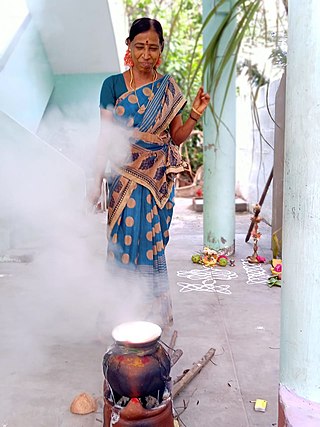
Pongal also referred to as Thai Pongal, is a multi-day Hindu harvest festival celebrated by Tamils. It is observed in the month of Thai according to the Tamil solar calendar and usually falls on 14 or 15 January. It is dedicated to Surya and corresponds to Makar Sankranti, the Hindu observance celebrated under many regional names throughout the Indian subcontinent. The festival is celebrated over three or four days with Bhogi, Surya Pongal, Mattu Pongal and Kanum Pongal, observed on consecutive days.
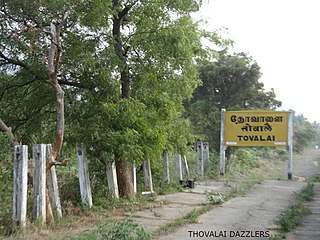
Thovalai is a small village located in Kanyakumari district, Tamil Nadu, India. The area is well known in India for its production of flowers, especially jasmine. The taluk was among the four in Thiruvananthapuram district that with the passage of the States Reorganisation Act of 1956 were transferred from Thiruvananthapuram district, Travancore-Cochin State to the newly created Kanyakumari district of Madras State.

Bhavani is a municipality in Erode District, Tamil Nadu, India. It is located at the northern periphery of Erode City Municipal Corporation and is around 105 km (65 mi) from Coimbatore and 60 km (37 mi) from Tiruppur and Salem. Bhavani is also known as "Carpet City" as it is known for its carpet industry; blankets and carpets manufactured in the town are known as Bhavani Jamakkalam. As of 2011, the town covers an area of 2.17 square kilometres (0.84 sq mi) and has a population of 39,225. It is a grade II municipality.

Puthandu, also known as Tamil New Year, is the first day of year on the Tamil calendar that is traditionally celebrated as a festival by Tamils. The festival date is set with the solar cycle of the solar Hindu calendar, as the first day of the month of Chittirai. It falls on or about 14 April every year on the Gregorian calendar. The same day is observed elsewhere in South and South East Asia as the traditional new year, but it is known by other names such as Vishu in Kerala, and Vaisakhi or Baisakhi in central and northern India.

Tihar is a five-day spiritual and cultural Hindu festival of lights celebrated by Nepalese as well as by the Indian Gorkhas inhabiting Sikkim state and Territories. Tihar is analogous to the Indian festival of Diwali, the festival of lights, but both are different Festival.

Melur is the Northern entrance of Madurai district. It is the town and municipality in the Madurai North in the Indian state of Tamil Nadu. Melur Old Name is Called Naduvi Nadu. The name Melur name comes from "Mela Nadu". Melur is called Thaigramam. It is the biggest taluk within the Madurai District. As of 2011, the town had a population of 40,017. Melur is an agricultural land in Madurai and the climate around the area is tropical.
Kombanai Pudur, sometimes written as Kombanai Pudhur, is a small village in Erode District, Tamil Nadu in India. Two canals flow through the centre of the village, namely Kurankan Canal and Kalingarayan Canal. It has one government hospital, also used as a veterinary hospital.
Haldi Kumkum, or the Haldi Kumkum ceremony, is a social gathering in India in which married women exchange haldi (turmeric) and kumkum, as a symbol of their married status and wishing for their husbands' long lives.
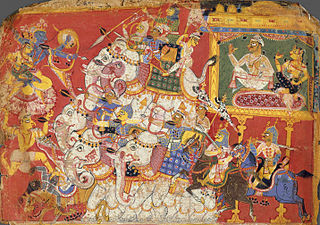
Naraka Chaturdashi is an annual Hindu festival that falls on Chaturdashi of the Krishna Paksha in the Hindu calendar month of Ashvin or Kartika. It is the second day of the five-day long festival of Diwali. Hindu literature narrates that the asura (demon) Narakasura was killed on this day by Krishna and Satyabhama. The day is celebrated by early morning religious rituals, and festivities follow on.
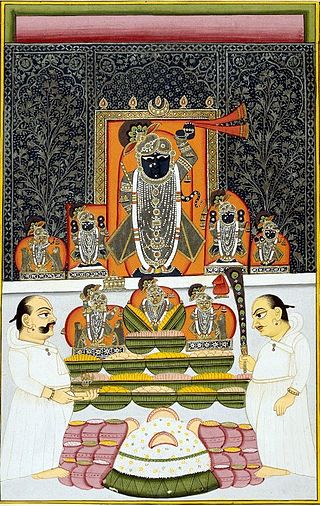
Govardhan Puja, also known as Annakut or Annakoot, is a Hindu festival celebrated on the first lunar day of the bright fortnight of the month of Kartika, on the fourth day of Diwali. Devotees worship Govardhan Hill and prepare and offer a large variety of vegetarian food to Krishna as a mark of gratitude. For Vaishnavas, this day commemorates the incident in the Bhagavata Purana when Krishna lifted Govardhan Hill to provide the villagers of Vrindavan shelter from torrential rains. This incident symbolizes God offering protection to devotees who take singular refuge in him. Devotees offer a mountain of food, metaphorically representing the Govardhan Hill, to God as a ritual remembrance and to renew their faith in taking refuge in God. The festival is observed by most Hindu denominations all over India and abroad.
Kondayampalli is a Grem panchayat in Gangavalli taluk, Salem district, Tamil Nadu State, India.
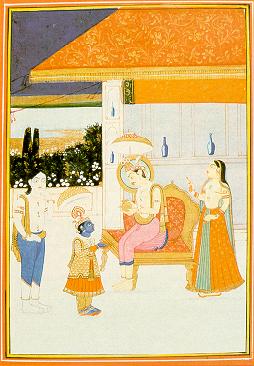
Balipratipada, also called as Bali-Padyami, Padva, Virapratipada or Dyutapratipada, is the fourth day of Diwali, the Hindu festival of lights. It is celebrated in honour of the notional return of the daitya-king Bali (Mahabali) to earth. Balipratipada falls in the Gregorian calendar months of October or November. It is the first day of the Hindu month of Kartika and is the first day of its bright lunar fortnight. In many parts of India such as Gujarat and Rajasthan, it is the regional traditional New Year Day in Vikram Samvat and also called the Bestu Varas or Varsha Pratipada. This is the half amongst the three and a half Muhūrtas in a year.
Mattu Pongal is the third day of the four-day Pongal festival. According to the Gregorian calendar it is celebrated on 16 January. Though the name of the festival is specific to Tamil Nadu, it is also celebrated in other southern Indian states such as Andhra Pradesh and Karnataka. Makar Sankranti is a festival that marks the start of northern declination of the Sun from the Zodiac sign of Sagittarius to Capricorn, which according to Tamil calendar usually falls on 14 January.
Theppakulathuparai is a small village which is part of the Thirumalayampalayam town panchayat under the Coimbatore district in the Indian state of Tamil Nadu. As the name suggests it has rocky areas (parai). It is close to the Kerala border and enjoys a pleasant climate throughout the year. It is a village with less than 50 houses and only two small grocery stores selling essentials.
T.Subbulapuram is a village in Andipatti Taluk in Theni District, Tamil Nadu State, India. It is located around 5 kilometres from the town of Andipatti, 20 kilometres from Theni, and 57 kilometres from Madurai.

Surasamharam, also called Suranporu, is a Hindu ritual folk performance that recreates the legend of the killing of asuras by the deity Murugan. It is the culmination of the week-long Kanda Shasthi Vratam festival. It is performed mainly in Tamil Nadu. It is also celebrated in Andhra Pradesh, Sri Lanka, and the district of Palakkad in Kerala at temples dedicated to Murugan. This festival falls in the month of either Aippasi or Kartikai of the Tamil calendar. In the lunisolar calendar, Surasamharam falls on the 6th day on the bright half phase of the Kartika lunar month, just 6 to 7 days after Diwali. Most South Indians celebrate Surasamharam as part of the 6 day fast known as Maha Skanda Sashti, starting from the day after Diwali up through the 6th day. On the day after Surasamharam, also known as Thirukalyanam, where it is believed that Lord Murugan marries Valli and Devayanai. Most people who choose to observe their fast will typically break it after observing the sacred marriage performed at a temple.

Mampatti is a village in Singampunari Taluk in Sivagangai District of Tamil Nadu State, India. It comes under Mampatti South panchayath union. It is a constituent of the ancient "Mallakottai Nadu" once, which was a part of 'Sivagangai Seemai'. For administrative purpose, the whole Mampatti region was divided into three Revenue Villages namely South Mampatti, North Mampatti and Mampatti Devasthanam, each under the authority of a Village Administrative Officer. Mampatti Devasthanam is the region that covers the land of temples that belongs to Sivagangai Samasthanam Devasthanam.

Balasubramaniyaswamy temple in Vennaimalai, a village in the outskirts of Karur in Karur district in the South Indian state of Tamil Nadu, is dedicated to the Hindu god Murugan. Constructed in the Dravidian style of architecture, the temple is located in the Karur - Pugalur Road. The legend of the temple is associated with Kamadhenu taking up the duties of Hindu god of creation Brahma and creating the hill of butter named Vennaimalai.
The Pidakala War is a local folklore-based annual cow dung fight held in the village of Kairuppala near Aspari in Kurnool district of India. The village is split into two sides representing various local communities,Hindus mainly. This celebration is assumed to have started in this village based on local traditions, and is not sanctioned by any major Hindu religious body (matha).
References
- ↑ https://www.hindustantimes.com/india-news/this-indian-village-celebrates-cow-dung-festival-to-mark-end-of-diwali-101636307698144.html
- ↑ "Gorehabba". Society for the Confluence of Festivals in India (SCFI). Retrieved 2013-04-12.
- ↑ Phadnis, Shekher (October 16, 2011). "A Strange Diwali Celebration". The Navhind Times. Archived from the original on January 28, 2012. Retrieved 2013-04-12.
- ↑ Madhav, Pramod (November 4, 2024). "Why does this Tamil Nadu village throw cow dung to end Diwali?". India Today . Retrieved January 10, 2025.